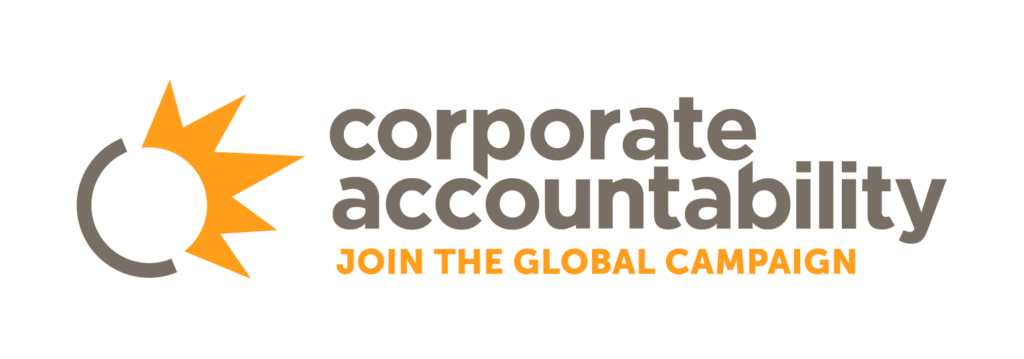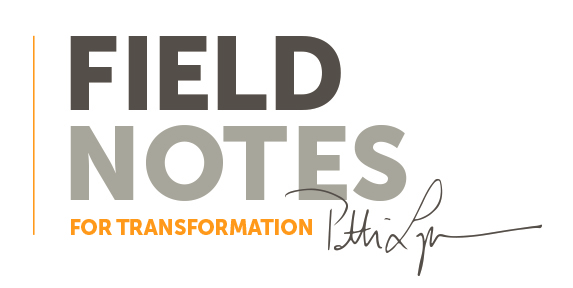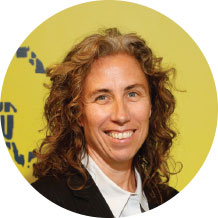

On fire: Our campaign impact, my drive to organize, and passing the leadership torch
Dear friend,
Last year, for the first time ever, fossil fuel lobbyists (along with everyone else) had to declare who they represent before they showed up at the U.N. climate treaty negotiations.
This probably doesn’t sound like much to most people. But you probably know that however commonsense this requirement seems, it was absolutely unthinkable when we first started campaigning at the U.N. climate treaty. We and our allies were ignored, mocked, and shut down for simply stating the obvious: Big Polluters like Shell and Chevron should not advance their interests in climate policy.
So the milestone we and our allies achieved last summer—that treaty participants had to declare who they represent—was tremendous.
This achievement paves the way for what needs to happen next. Like removing Big Polluters’ influence and making them pay for the harms they cause. And like creating space to advance real solutions being championed by those most harmed by Big Polluters.
It’s not too different from when I first started organizing on the tobacco campaign in the early 2000s. Few believed that we and our Global South allies could secure an international treaty that defied the powerful interests of the U.S. government and the tobacco industry.
But that’s exactly what we did. The Framework Convention on Tobacco Control became the first international treaty with corporate accountability measures. It not only dramatically changed the way the tobacco industry could operate around the world, but it also set an important precedent for holding other deadly corporations accountable. Today, its measures can save millions of lives each year.

Our guiding light
Here’s the thing: At Corporate Accountability, we are guided by what is necessary, not what seems possible in the moment.
And we do it through organizing grounded in relationships, guided by a clear mission, and fueled by imagination. Together, we make the impossible possible.
And right now, what’s necessary is radical transformation. The roots of our broken systems must be addressed quickly and justly. We need systems where all people, beings, and the planet can not only survive, but thrive.
I admit there are days when this vision feels impossible. But then I’m reminded of all of the ways this organization, our allies, and people around the globe are working toward such a world.
It’s a tremendously exciting time to be part of Corporate Accountability. We are more connected to global social movements than ever before. We understand our corporate campaigning as a necessary part of broad movements countering the rise of authoritarianism and systemic attacks on human rights and freedom. We are organizing alongside and following the leadership of those most harmed by abusive corporations. And we are connecting racial, economic, and climate justice as we help shape the world into one that puts people and the planet above corporate interests.
Building on strength
And so, this is the exact right moment for me to step into a different role at Corporate Accountability.
I hope that by now you have received this news. If not, I invite you to read the statement on our website from me and our board chair about my transition from this role.
Corporate Accountability is a strong and leaderful organization. We are financially stable. And, as you have read in previous Field Notes for Transformation, we have many people across the organization leading from where they are.
Plus, our campaigns are on fire.
I am an organizer at my core, no matter what other hat I wear at Corporate Accountability. So I can’t wait to be able to put my full attention and energy behind our high-impact campaigns.
We have achieved so much over the past few years—and there are so many more opportunities we can seize to make progress toward our mission.
Just a few examples:
- We’re co-creating sophisticated global climate campaigns to kick Big Polluters out of climate action and make them pay for the harms they cause. The communities that Big Polluters target for exploitation and abuse are leading the way, shaping the campaign to best reflect the realities and strategies of their regions.
- In Latin America, we’re advancing the Que Paguen (Make Them Pay) campaign in trusting partnerships with Indigenous communities. In Africa, we’re supporting organizing that ensures community voices are prioritized when it comes to “loss and damage” funding. And as California sues the fossil fuel industry, we are organizing to ensure justice for the communities on the front lines of climate change.
- Our water campaign is also making significant progress globally, rooted in long-term relationship-building that is the bedrock of our approach. Across Africa, local organizations and communities such as the Our Water, Our Right Africa Coalition are organizing to prevent the privatization of water. This coalition is supported by our collaboration with Corporate Accountability and Public Participation Africa (CAPPA). And although most of the world has looked away from Flint, Michigan, we and our long-time partners at Flint Rising still have our eye on justice. Together, we campaign to hold private water corporation Veolia accountable for its role in the city’s ongoing water crisis.
- On our food campaign, we are shifting the lens on who counts as an “expert” and what solutions are prioritized as we challenge corporations and their front groups. We are organizing with allies in the Global South and in the U.S. food and health justice movements to hold the food industry accountable. And we continue to amplify and support Indigenous and emergent solutions to reclaim global food systems from corporate control.
- The Corporate Accountability Black Collective is leading the way in exposing how corporations specifically harm, exploit, and profit off of Black communities. Our newest program is building relationships with Black-led organizations across issue areas and redistributing resources for Black grassroots organizing. We are educating and organizing to hold Wells Fargo accountable for centuries of racist practices.
Each campaign connects to the others as we stitch together the lessons, strategies, and approaches toward creating the change that is necessary.
We’re exploring how to more effectively bring racial justice approaches into our corporate campaigning. We’re strengthening processes that enable us to move forward in line with our values. And we’re connecting more deeply with movement partners toward greater impact.
All this gives me great confidence in passing the leadership torch.
Expanding our imagination
In the same spirit—that we organize toward what is necessary, not what seems politically feasible—Corporate Accountability doesn’t shy away from doing things differently from much of the nonprofit sector.
For example, not many executive directors move out of their position and back into programmatic work. I am deeply grateful for the opportunity to have led this organization as the executive director for seven years. It has been an honor to work with the brilliant and inspiring people on our staff, in our ally network, and in our membership.
But as a sector, we don’t have an infrastructure that enables good organizers to begin and end their careers in organizing. Instead, they (we) are absorbed into management. This has been a loss for our organizations and movements. (Thanks to the People’s Action Institute recent white paper, The Antidote to Authoritarianism for this articulation.)
Orienting toward what is necessary means expanding our imagination to find the best way forward. This is true whether in our campaigning or in our organizational structure.
So I’m looking forward to moving into a position where I can build power behind the next leaders of the organization, putting my full energy into organizing and fundraising.
It’s a little like coming back full circle. My first position at Corporate Accountability (back when it was Infact) was as a major gifts organizer. I loved meeting with members around the country who cared deeply about creating change.
Then, as now, I was inspired by members like you who are not satisfied with how change happens under the status quo. You also aim for what is necessary, not possible, and so it’s invigorating to be on the cutting edge with you. You, along with our staff, board, and allies, push us to grow and evolve toward our values and mission.
I look forward to more conversations and deeper thinking with you in the near future as, together, we create the change we need.

Onward,

Patti Lynn, Executive Director






